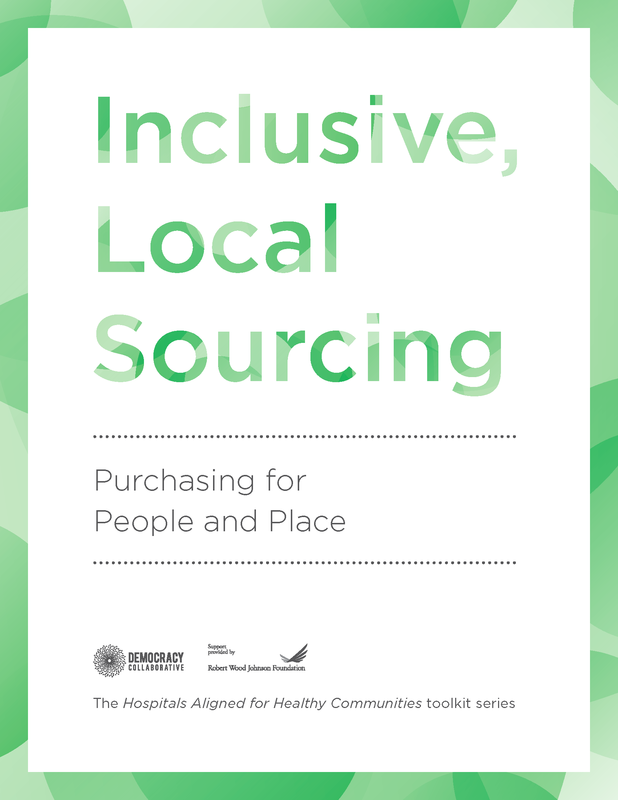Resource table of contents:
- Inclusive and Diverse Purchasing Resources
- Inclusive, Local Economic Development Resources
- Other Key Impact Purchasing Resources
1. Inclusive and Diverse Purchasing Resources
AMERICAN INDEPENDENT BUSINESS ALLIANCE (AMIBA)
The American Independent Business Alliance (AMIBA) is dedicated to helping communities become more self-supporting and resilient through fostering a culture that values and supports independent business and local entrepreneurs. AMIBA helping communities launch and successfully operate an Independent Business Alliance® (IBA), as well as providing extensive support, templates and resources for chambers, downtown organizations, local governments, independent trade associations and other entities working to help their local independent businesses thrive. Their Ten Studies of the “Local Economic Premium” helps illustrate the economic multiplier benefit from supporting locally owned businesses.
FIELD GUIDE FOR HEALTH SECTOR LEADERSHIP
This guide from the Business Alliance for Living, Local Economies (BALLE) is designed to help health care institutions to align the non-clinical assets of their organizations – from hiring to purchasing, investing to operations and facilities – with what actually works to build health in people and communities.
SOCIAL ENTERPRISE OPPORTUNITIES IN THE HEALTHCARE SECTOR
Authored by REDF, this paper aims to explore how social enterprises can collaborate with and fulfill the existing needs of large healthcare institutions, from both a procurement and hiring standpoint, to create living wage career pathways for people, leading to stronger health outcomes.
BILLION DOLLAR ROUNDTABLE
The Billion Dollar Roundtable (BDR) was created in 2001 to recognize and celebrate corporations that have achieved spending of at least $1 billion with minority- and woman-owned suppliers. The BDR promotes and shares best practices in supply chain diversity excellence through the production of white papers. An in-depth guide to supplier diversity and other tools and templates can be purchased via their website.
2. Inclusive, Local Economic Development Resources
BUSINESS ALLIANCE FOR LOCAL LIVING ECONOMIES (BALLE)
Business Alliance for Local Living Economies (BALLE) connects and supports a growing movement of local leaders, entrepreneurs, investors and funders who are building local economies that work for all.
NEXT STREET
Next Street provides advice and capital solutions to grow businesses, create jobs, and deliver financial and social returns to its partners. They work with institutions around procurement, workforce, real estate and infrastructure to catalyze growth in jobs and opportunities for local businesses and residents.
U3 ADVISORS
U3 Advisors is a national consulting practice that provides real estate and economic development solutions to the institutions that anchor our communities.
INSTITUTE FOR LOCAL SELF-RELIANCE (ILSR)
The Institute for Local Self-Reliance (ILSR) – ILSR provides innovative strategies, working models and timely information to support environmentally sound and equitable community development. It champions local self-reliance, a strategy that underscores the need for humanly scaled institutions and economies and the widest possible distribution of ownership.
INTERISE
Interise licenses its Streetwise ‘MBA’™ to partners who deliver it through their own locally branded programs. Delivered by its partners, its capacity-building Streetwise ‘MBA’™ provides small business owners with the knowledge, know-how, and networks they need to achieve scale.
DIVERSITY INC
Diversity Inc is a leading source of business information on diversity and inclusion management practices and policies.
3. Other Key Impact Purchasing Resources
LM3: LOCAL MULTIPLIER CALCULATOR AND ONLINE TOOL
The New Economics Foundation local multiplier toolkit helps calculate economic activity in the local economy: how money enters, the path it then takes, and how it leaves. LM3 Online provides instructions and guide for an online tool to measure economic impact for local procurement.
ANCHOR INSTITUTIONS TOOLKIT
Prepared by The Netter Center for Community Partnerships and the University of Pennsylvania (Penn), this anchor institutions toolkit is intended to serve as a guide for neighborhood revitalization and share lessons learned from Penn’s work as an anchor institution in West Philadelphia.
HEALTH CARE WITHOUT HARM
Health Care Without Harm seeks to implement ecologically sound and healthy alternatives to health care practices that pollute the environment and contribute to disease. It offers resources, tools and best practices around healthcare practices for local food purchasing and environmentally preferable purchasing, among many other areas.
AHA’S 123 FOR EQUITY PLEDGE
AHA’s 123 for Equity Pledge, launched in 2015, builds on the efforts of the National Call to Action to Eliminate Health Care Disparities – a joint effort of the AHA, American College of Healthcare Executives, Association of American Medical Colleges, Catholic Health Association of the United States and America’s Essential Hospitals – and asks hospital and health system leaders to begin taking action to accelerate progress in reducing disparities.
HEALTHCARE-SPECIFIC DIVERSITY AND CULTURAL PROFICIENCY ASSESSMENT TOOL
Produced by the American Hospital Association, National Center for Healthcare Leadership and American College of Healthcare Executives, this tool provides action steps and case studies for healthcare organizations to better assess whether their institution reflects the diversity of the community they serve.
INCREASING SUPPLIER DIVERSITY IN HEALTHCARE TOOLKIT
Produced by Health Research & Educational Trust (an affiliate of American Hospital Association), this toolkit provides an overview of supplier diversity efforts by health systems and shares best practices.
NAACP OPPORTUNITY & DIVERSITY REPORT CARD ON THE HEALTHCARE INDUSTRY
The NAACP Opportunity and Diversity Report Card: The Healthcare Industry is the third in a series of reports and is based on the earlier Economic Reciprocity Initiative: NAACP Consumer Choice Guide. In this report card the NAACP analyzes the consumer healthcare industry’s inclusion and diversity practices as they pertain to the race and ethnicity of its workforce, management, and suppliers.
